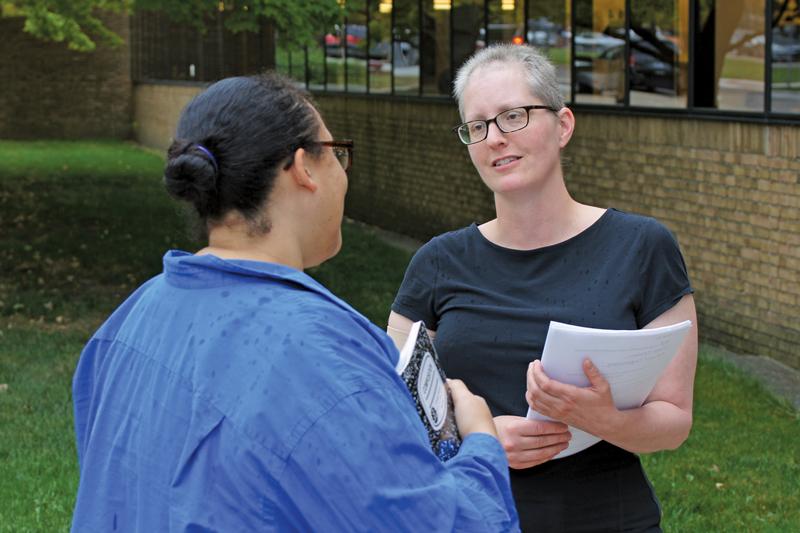One year ago, Jessica Prozinski was a stay-at-home mom and part-time piano teacher enjoying a quiet life with her husband, Mike, and young daughter, Veronica. Then Donald Trump was elected president–and she was diagnosed with cancer.
Prozinski, forty-two, describes herself as an “old radical.” After Trump’s victory, she became “really depressed and just stayed in bed for a couple of days.” Then she got up and joined other “shell-shocked” women friends attending various political gatherings–“we felt we had to do something,” she says.
None of the groups clicked for her. Wanting one “that was less focused on electoral politics and more focused on direct action,” she organized her own, Stop Trump Ann Arbor (STAA). To find others who felt the same, she turned to social media. “I would see other political leaders that had thousands of friends on Facebook,” she says, “and I thought ‘OK, how do I do that? Because I need that.’ So I would friend people that had gone to events that I had gone to.”
She admits that “it felt really strange at first, kind of invasive and definitely going out of my comfort zone to be sending people friend requests when I didn’t know them, because I don’t like when people do that to me!” She adds, laughing: “But I was like, ‘It’s too important. I just have to do it.'” She currently has some 3,500 personal Facebook friends, and more than 1,000 people follow STAA’s public page.
Last December, when the group was in the midst of organizing its first rally at the State Capitol, Prozinski had her first mammogram–and learned that she had cancer in both breasts. “It was really hard to deal with at first,” she says of the diagnosis. “You have to confront your own mortality much more intimately than you thought you would have to.”
She ultimately took the same approach to cancer that she does with politics. “I just wanted to take action: ‘OK, what’s the plan? Let’s do the surgery! Let’s do the chemo!’ It feels terrible to just do nothing.” She’s since gone through surgery and chemotherapy and began radiation treatment in October.
—
Prozinski and I meet for coffee at the Plymouth Rd. Starbucks. Her silvery hair has just started to grow back. She looks a little tired, but her voice has the quiet assurance you’d expect from a former schoolteacher–after graduating from U-M in 2002, she taught in the Detroit Public Schools for seven years. “I just finished my last round of chemo, so my brain is kind of foggy,” she apologizes. “Everything I say–just make it sound a little bit smarter!”
As she went through treatment, she found distraction and purpose in her activism. STAA has initiated or participated in more than thirty events, including protesting Trump’s visit to Ypsilanti in March and federal court hearings in Detroit where undocumented immigrants are facing deportation.
She says she fully supports trying to get “good people in office”–but she also believes “in the power of protests and direct action to force political change outside the approved or usual methods.”
Prozinski forms an intergenerational team with STAA’s co-leaders, Leroy Lewis Jr. and Keysha Wall. “My writing tends to be more eloquent,” says Wall, a U-M art and design student. “But Jessica … she’s much better at getting to the nitty-gritty, to the gist of what’s going on … She’s a force.”
That they’re organizing in a progressive community is both a blessing and a curse. “I think Ann Arbor is a really interesting and unique place, in that we have a lot of political activism and a really high level of political consciousness,” says Prozinski. “The flip side of that is that our differences are really well developed.”
When progressives clash in Ann Arbor, she says, “I think a lot of it comes down to ‘how radical are your politics?'” STAA activists have been attacked by some for being too radical (that, says Wall, “comes down to if you’re willing to be arrested”), and others have complained the group is insensitive to identity issues (one woman told Prozinski that she didn’t believe STAA should have any white speakers at an event).
But “organizing protests isn’t that complicated,” Prozinski insists. “Honestly, it’s fun and easy.” To demonstrate, she pulls up a planning page for their next rally in Lansing. Along with practical questions like “do we need to bring a generator?” she says, laughing, “someone wants to know who has Don Nuggets, the old inflatable chicken.”
Born Jessica Curtin, the daughter of a school librarian and an engineer, she grew up in Canton and Farmington Hills. As a U-M student, she protested sexual harassment and advocated for affirmative action, then moved to Detroit, where she taught ninth-grade history. “The conditions you’re placed in [are] just so, so difficult,” she says of her years there. “But there’s also a feeling of camaraderie, like ‘we’re all in this together …’ among the teachers but also between the teachers and the students.”
In 2009, she married Mike Prozinski, an engineer with General Motors, and returned to Ann Arbor. She says her husband is “very, very supportive” of her political work–“there’s no way I’d be able to do this without his having a real job.” A typical day includes taking Veronica to school, doing “housewife stuff” like grocery shopping and cleaning, and teaching a piano lesson or two in the evening. “Pretty much the rest of my time I spend organizing.”
—
In early October, half a dozen people join Wall and Prozinski for a meeting at the downtown library; Prozinski arrives with Veronica in tow. She efficiently facilitates a discussion of action plans, logistics, and a long-overdue official list of principles. When someone comments that STAA hasn’t organized an event lately, she says that she’s “taking more time to read and think and look at the whole situation. Where do we go from here? What’s our most effective use of time?”
She sees her activism as a long-term commitment. “Trump is something different and dangerous obviously, but we’re not just about stopping Trump,” she says. “We’re about stopping everything that he stands for and represents.
“I just think that we’re in a really scary period of history. I think there’s a false sense that we all walk around with that things don’t change that much, and that’s not true. Democracies fail. World wars happen. I was a history teacher. I have a really sharp sense that those are real possibilities, that we can’t just sit on the sidelines and wait to see how it plays out.
“We’re on a precipice. We have serious dangers all around, but at the same time, we can really have an impact on what happens.”



Well – I guess we have been on that ‘precipice’ for 2 years and the world seems to be safer, people of color are more employed than ever and women have more involvement in government than ever before. I guess the old axiom is true: Beggars can’t be Choosers – in this case, those that choose to resist POTUS and the Rule of Law are the former.